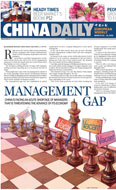Politics
China to test water, food for radiation
Updated: 2011-03-29 07:27
By Shan Juan and Wang Huazhong (China Daily)
Beijing - The Ministry of Health has ordered local administrations in 14 places including Beijing, Tianjin, Shanghai and some coastal provinces to test drinking water and food for radiation, according to an online statement issued on Sunday.
|
![A worker with the entry-exit inspection and quarantine bureau in Rizhao city, East China's Shandong province, checks frozen fish imported from Japan on March 24. [Provided to China Daily] China to test water, food for radiation](../../images/attachement/jpg/site1/20110329/002170196e1c0efb5e1f22.jpg) A worker with the entry-exit inspection and quarantine bureau in Rizhao city, East China's Shandong province, checks frozen fish imported from Japan on March 24. [Provided to China Daily] |
The announcement came after the authority had confirmed over the weekend that the level of radiation stemming from iodine-131, a radioactive isotope, was higher than usual in four counties in Northeast China's Heilongjiang province.
Exposure to iodine-131 can cause several diseases including thyroid cancer, according to the statement.
|
||||
"Based on the current situation, people don't need to worry about the contamination of the air or of food and water here," said Wang Zhongwen, a researcher at the China Institute of Atomic Energy's radiation safety department.
As for the radiation testing ordered by the ministry, Wang said it was part of routine inspections of food and water undertaken in many parts of the country.
Largely in response to various scandals involving tainted food in recent years, China has become ever more painstaking in its attempts at ensuring the safety of its food.
Many countries routinely test the radiation levels of their domestic food and water supplies. China, though, only has the means to conduct such tests in a few regions, not across the entire country, Wang noted.
"The Japan nuclear incident might help shorten the time it will take to establish similar testing in other places in the country," he said.
To prevent contamination, the General Administration of Quality Supervision, Inspection and Quarantine has prohibited the importation of some Japanese foods, including dairy products, seafood and vegetables.
Meanwhile, the Chinese public, including residents of the counties where the higher level of radiation was found, remains unfazed.
Zhao Haixing, deputy director of the Hulin county environmental protection bureau, said on Monday that the radiation level there had not changed since Sunday and that being in the county "is less harmful than getting a medical X-ray".
"Life is as peaceful as ever," Song Yufeng, a local publicity official, said on Monday.
"Our county gets most of its information from the TV," he said. "And the TV shows have made it clear to everyone that there is too little radiation to pose health hazards."
Officials in nearby counties said they have not seen panicked customers buying up iodine tablets or other substances often used as protection against radiation.
E-paper

Rise and shine
The Chinese solar energy industry is heating up following recent setbacks in the nuclear sector
Bombs aim for regime change
CSI, with a twist
Literary path
Specials

Peony express
Growers of china's unofficial national flower are reaching out to europe for help

Tea-ing up
More turning to Chinese tea for investment opportunities like vintage wine

A cut above
The ancient city of Luoyang is home to a treasure trove of cultural wonders.




